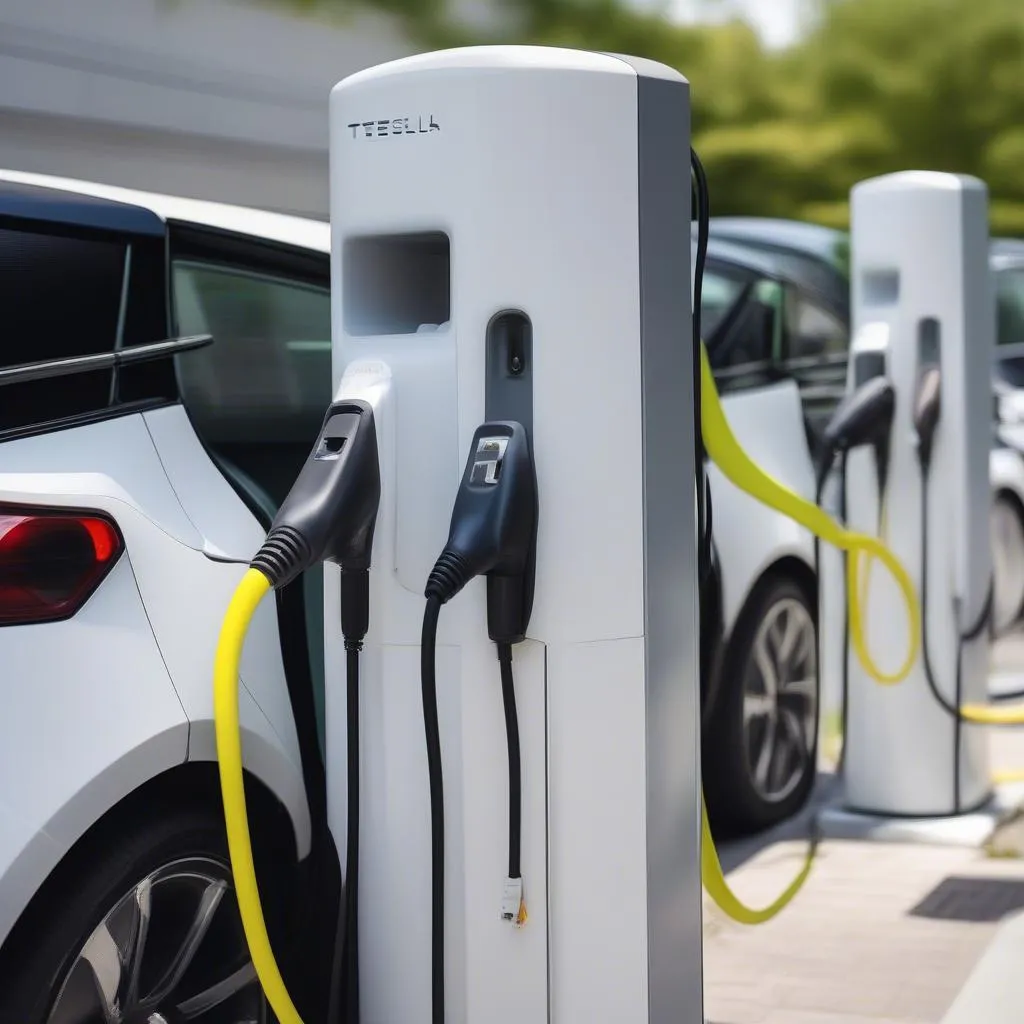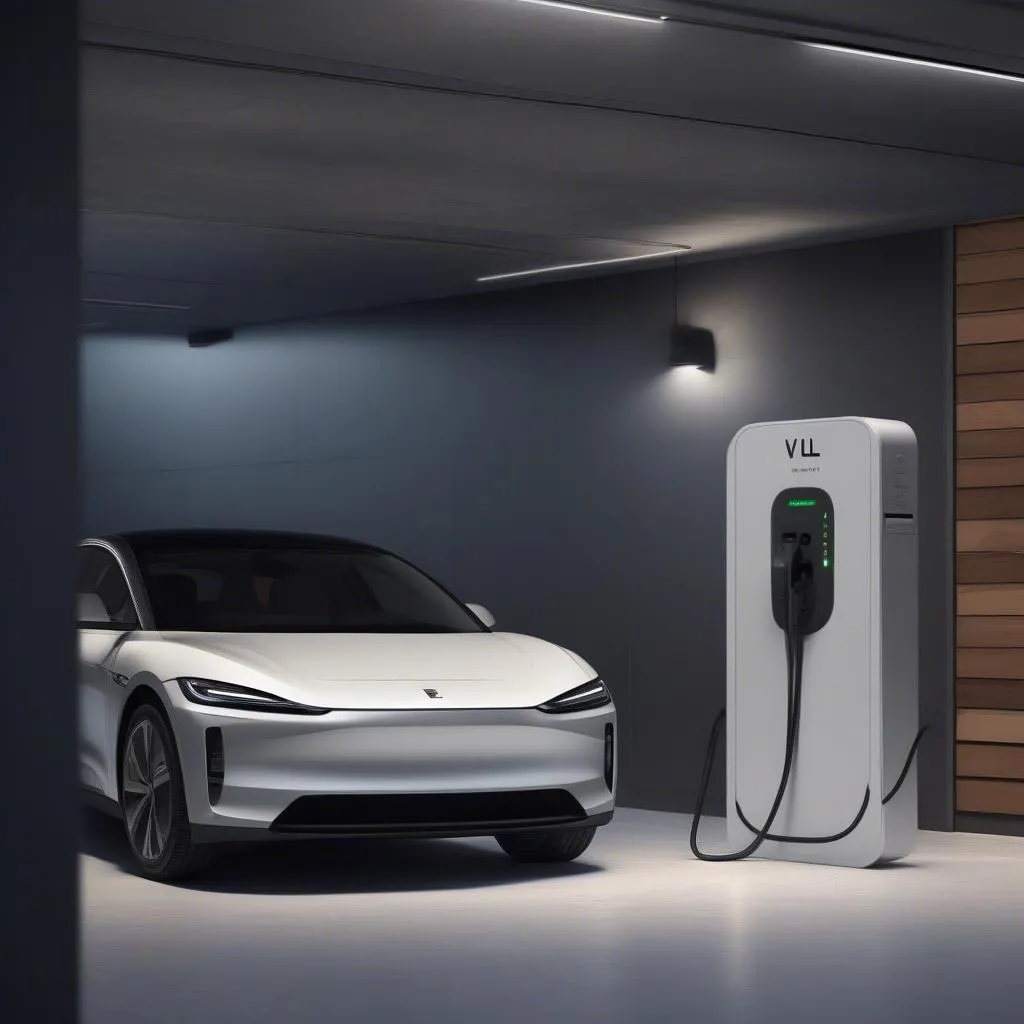Picture this: you’re cruising down the Pacific Coast Highway in your sleek new Tesla Model S, the California sun warming your face. You glance at the battery gauge and realize it’s time to recharge. But where’s the nearest gas station… err, charging station? Don’t worry, embracing the electric vehicle (EV) revolution doesn’t mean saying goodbye to convenient refueling. Understanding the world of EV car chargers is key to a smooth and enjoyable electric driving experience.
What is an EV Car Charger, Anyway?
You might be surprised to learn that the term “EV car charger” is a bit of a misnomer. The real charging magic happens inside your electric vehicle, within its onboard charger. What we commonly call EV car chargers are technically Electric Vehicle Supply Equipment (EVSE). Think of it like this: your smartphone has an internal charging circuit, and the wall adapter is like the EVSE.
From an automotive technician’s perspective, the EVSE acts as a safe and controlled conduit between your home’s electrical system or a charging station and your EV’s battery. It provides the right amount of power, in the correct format, ensuring your car’s battery is juiced up safely and efficiently.
On the economic front, the rising popularity of EVs has spurred a global surge in demand for EVSE, creating a dynamic market with numerous manufacturers offering innovative solutions. This competition benefits consumers, leading to more affordable and technologically advanced charging options.
Demystifying EV Car Chargers: Levels and Types
Just like there are different ways to fuel a gas-powered car, there are various ways to charge an EV. Understanding these charging levels and types is crucial for optimizing your charging experience.
Level 1 Charging: Slow and Steady
Imagine you’re on a road trip and need a quick power nap for your EV. That’s Level 1 charging—it uses a standard 120-volt household outlet and typically comes standard with your EV.
- Pros: Convenient and accessible almost anywhere.
- Cons: Provides the slowest charge, adding just a few miles of range per hour.
Level 2 Charging: The Home Sweet Home Option
Think of Level 2 charging as your EV’s preferred overnight resting spot. This method uses a 240-volt outlet, similar to the one used for your dryer, and significantly reduces charging time compared to Level 1.
- Pros: Faster charging, making it ideal for home installation. Many public charging stations also utilize Level 2 charging.
- Cons: Requires professional installation and may involve additional costs.
Level 3 Charging: The Road Trip Savior
Envision this: you’re on a cross-country road trip in your electric Mustang Mach-E, and you need a quick energy boost to reach your destination. That’s where Level 3 charging, also known as DC fast charging, comes in.
- Pros: Offers the fastest charging speeds, often adding hundreds of miles of range in under an hour.
- Cons: Typically found in public charging stations and can be more expensive than Level 2 charging. Not all EVs are compatible with DC fast charging.
“Level 3 chargers are like the espresso shots of the EV charging world,” says Dr. Emily Carter, a renowned electrical engineer and author of “The Future of Electric Mobility”. “They provide a rapid energy boost, enabling long-distance travel and reducing range anxiety among EV drivers.”
Common Queries about EV Car Chargers
Choosing the right EV charger can feel like navigating a maze of technical jargon. Here are answers to some frequently asked questions to guide you:
- What type of charger do I need for my EV?
This depends on your vehicle model and charging needs. Consult your EV’s owner’s manual or the manufacturer’s website to determine the recommended charging levels and connector types.
- How much does it cost to install an EV charger at home?
Home EV charger installation costs can vary based on factors like your location, electrical panel capacity, and charger type. It’s best to get quotes from qualified electricians to estimate the total cost accurately.
- Are there government incentives for purchasing EV chargers?
Many countries and regions offer tax credits, rebates, or other incentives to encourage EV adoption, including the purchase and installation of home charging equipment. Research the incentives available in your area.
- Can I charge my EV in the rain?
Yes, EVs and EVSE are designed with safety in mind and can withstand rain exposure. However, it’s always a good idea to exercise caution and avoid touching the charging equipment or your EV’s charging port during heavy rain.
Related Questions You Might Be Asking
Beyond the basics, here are some additional questions EV enthusiasts often ponder:
- Can I use an extension cord with my EV charger?
Using extension cords with EV chargers is generally not recommended due to safety risks and potential voltage drops.
- What is a smart EV charger?
Smart EV chargers offer advanced features like scheduled charging, remote monitoring, and energy consumption tracking, often through a smartphone app. They can optimize charging costs and enhance convenience.
- Are there different connector types for EV charging?
Yes, different EV models utilize different connector types. Common types include CCS (Combined Charging System), CHAdeMO, and Tesla’s proprietary connector. Make sure you have the correct connector type for your vehicle before plugging in.
 EV charging station types
EV charging station types
Exploring More EV-Related Topics
Hungry for more insights into the world of electric vehicles and automotive technology? Dive into these related articles:
Need Expert Assistance with Your EV Charging Needs?
We understand that navigating the world of EV car chargers can be overwhelming. If you’re in need of expert advice or assistance setting up your home charging solution, don’t hesitate to reach out. Our team of automotive specialists is here to help you make the electric switch with confidence.
Contact our team on WhatsApp at +84767531508, and let us help you power up your electric journey.
 Electric car charging at home
Electric car charging at home
Embrace the Electric Future
Choosing the right EV car charger is an essential step in embracing the future of transportation. By understanding the various charging levels, types, and common considerations, you can confidently charge your EV at home, on the go, and enjoy a seamless electric driving experience.
Have questions or experiences to share about EV car chargers? Let’s spark a conversation in the comments below! Don’t forget to check out our other articles for more automotive insights and tips.


